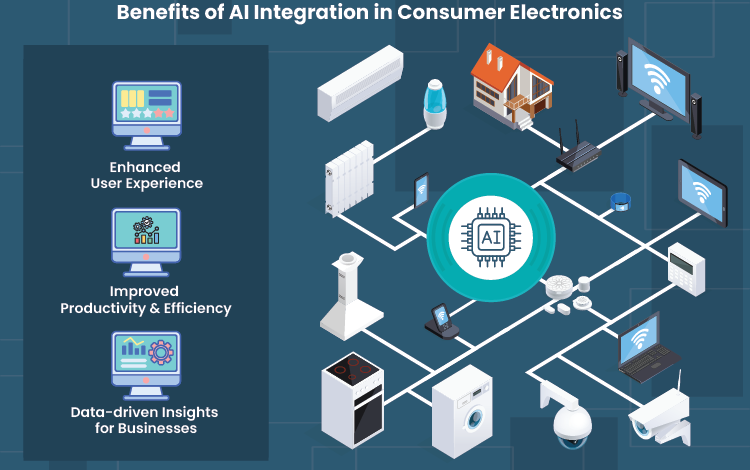How Artificial Intelligence Is Shaping the Future of Consumer Electronics

Artificial Intelligence (AI) has rapidly advanced in recent years, making its way into many industries and everyday products. How Artificial Intelligence is shaping the future of consumer electronics is a question that sparks interest as it unveils the transformative power of AI. From smartphones to smart homes, AI is changing how we interact with technology, making devices smarter, more efficient, and more personalized. This article explores the significant role AI plays in consumer electronics, highlighting the latest innovations, the impact on product design, and how it is shaping our future interactions with technology.
The Role of AI in Consumer Electronics
AI technology is revolutionizing the way consumer electronics work, bringing enhancements that were once thought to be science fiction into reality. Today, AI is at the core of many modern gadgets, powering everything from smartphones to home assistants. How Artificial Intelligence is shaping the future of consumer electronics is evident in the advancements that make devices more responsive and intuitive.
Smartphones, for example, have AI systems that improve camera quality, optimize battery life, and offer personalized suggestions. Voice assistants like Amazon’s Alexa and Apple’s Siri use AI to understand and respond to natural language, making it easier for users to control their devices with simple voice commands. These improvements are only the beginning, with AI continuing to push the boundaries of what consumer electronics can do.
AI Enhancing User Experience in Electronics
A major benefit of AI in consumer electronics is its ability to enhance user experience. AI-powered devices can learn from user preferences and behaviors, offering personalized settings and recommendations. For example, AI in smart TVs can suggest shows or movies based on your viewing history, while smart speakers adapt to the way you communicate with them over time.
The impact of AI on consumer electronics is significant in the realm of personalization. Devices can predict user needs and adapt accordingly, creating a seamless experience that was not possible before. This personalized touch has made electronics not just tools, but extensions of our daily lives.
Smart Home Devices and AI Integration
One of the most exciting developments in consumer electronics is the rise of smart homes, powered by AI. Devices such as thermostats, security cameras, and lighting systems are becoming smarter through AI integration. For example, smart thermostats like Nest learn from your preferences and daily routines, adjusting the temperature accordingly without the need for manual input.
The impact of AI on the future of consumer electronics is especially noticeable in smart home systems, where multiple devices work together in harmony. AI allows these systems to communicate with each other, ensuring they work more efficiently and provide greater convenience. This level of automation makes everyday tasks easier and more energy-efficient.
Read more about : Sumo search
AI-Powered Wearables: The Future of Fitness and Health Tech
Another area where AI is making waves in consumer electronics is the development of wearables. Smartwatches and fitness trackers are becoming more intelligent, with AI algorithms that track health data and provide insights into your daily habits. Devices like the Apple Watch can monitor heart rate, detect irregularities, and even remind users to stay active.
The use of AI in consumer electronics for health and fitness offers a significant advantage. These devices are constantly learning from your activities, allowing them to provide more accurate data and personalized fitness plans. With AI, wearables are evolving into essential tools for health management, not just tracking.
AI in Consumer Electronics: Transforming Communication Devices
The way we communicate has changed dramatically thanks to AI. Smartphones, laptops, and tablets are becoming more sophisticated with AI features that improve communication. AI-powered voice recognition systems make typing easier through predictive text, and AI-enhanced cameras now adjust settings to take the best possible photos in any lighting conditions.
In addition, AI is helping enhance video calling and messaging services. Through better video compression, real-time translation, and automatic background adjustments, AI improves the quality of communication, making virtual interactions feel more natural and seamless.
AI and the Evolution of Gaming Technology
Gaming technology is another area where AI is significantly shaping the future of consumer electronics. AI is being used to create more realistic and challenging gameplay experiences. In video games, AI algorithms control non-playable characters (NPCs), making them react intelligently to the player’s actions. This level of unpredictability and realism enhances the immersive experience.
AI is also transforming gaming hardware. For example, AI is used in gaming consoles to optimize performance and enhance graphics in real-time. The impact of AI on the future of consumer electronics in gaming is evident, as it’s pushing the boundaries of what’s possible, creating more dynamic and engaging gaming environments.
The Future of AI in Consumer Electronics
As AI continues to evolve, its influence on consumer electronics will only grow. In the coming years, we can expect even smarter devices that can anticipate our needs before we even express them. AI will likely become even more embedded in everyday life, making technology more intuitive, responsive, and personalized.
The impact of AI on the future of consumer electronics is vast, as it shapes everything from personal gadgets to complex home automation systems. As more devices become interconnected, AI will help create ecosystems that work together effortlessly. This interconnected future will provide consumers with even more convenience, control, and customized experiences.
Conclusion: How Artificial Intelligence Is Shaping the Future of Consumer Electronics
How Artificial Intelligence is shaping the future of consumer electronics is already visible in many of the devices we use daily. From smart homes and wearables to personalized user experiences and enhanced communication, AI is playing a pivotal role in transforming the consumer electronics industry. Just as the Orlando Magic vs Cleveland game showcases the power of data and performance analysis in sports, AI is driving innovation in tech, making products smarter and more efficient. As AI continues to evolve, its impact will only grow, creating even more advanced products that will shape the future of technology for years to come.



